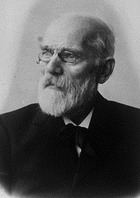Van der Waals, Johannes Diderik
| Topics: |
Johannes Diderik Van der Waals (1837 – 1923) was a Dutch physicist who won the 1910 Nobel Prize for Physics due to his research on the gaseous and liquid states of matter. His hypothesis about the continuity of the gaseous and liquid states of matter (1873) combined the kinetic theory of gases with Laplace’s theory of capillarity. In his theory of corresponding states (1880), he presented an equation of the state (now named for him) for homogeneous substances in terms of pressure, volume, and temperature. Contrary to the ideal gas law, his equation contains constant factors to account for the fact that molecules are of finite size and experience weak forces of mutual attraction (now called van der Waals forces).
Further Reading
Van der Waals Biography (Nobelprize.org)
Van der Waals Equation (Perdue.edu)
Van der Waals Gas Law and Chemical Calculator (The University of Hull)
